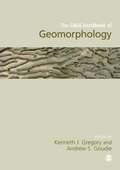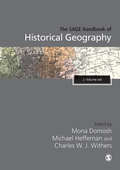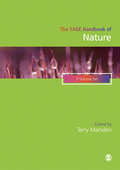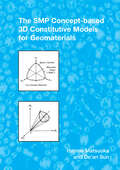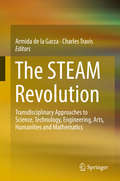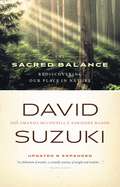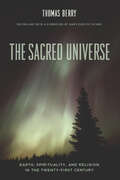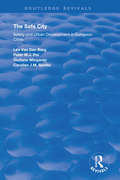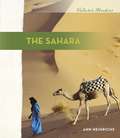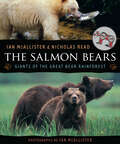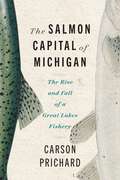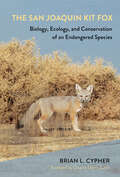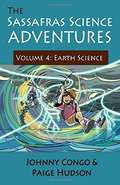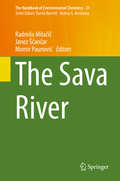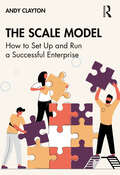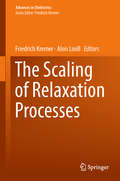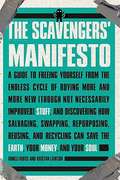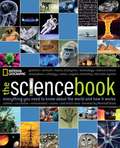- Table View
- List View
The SAGE Handbook of Geomorphology
by Kenneth J. Gregory Andrew S GoudieGeomorphology is the study of the Earth's diverse physical land-surface features and the dynamic processes that shape these features. Examining natural and anthropogenic processes, The SAGE Handbook of Geomorphology is a comprehensive exposition of the fundamentals of geomorphology that examines form, process, and applications of the discipline. Organized into five substantive sections, the Handbook is an overview of: * Foundations and Relevance: including the nature and scope of geomorphology; the origins and development of geomorphology; the role and character of theory in geomorphology; geomorphology and environmental management; and geomorphology and society * Techniques and Approaches: including observations and experiments; geomorphological mapping; the significance of models; process and form; dating surfaces and sediment; remote sensing in geomorphology; GIS in geomorphology; biogeomorphology; human activity * Process and Environment: including the evolution of regolith; weathering; fluids, flows and fluxes; sediment transport and deposition; hill slopes; riverine environments; glacial geomorphology; periglacial environments; coastal environments; aeolian environments; tropical environments; karst and karst processes * Environmental Change: including landscape evolution and tectonics; interpreting quaternary environments; environmental change; disturbance and responses to geomorphic systems * Conclusion: including challenges and perspectives; and a concluding review The Handbook has contributions from 48 international authors and was initially organized by the International Association of Geomorphologists. This will be a much-used and much-cited reference for researchers in Geomorphology, Physical Geography and the Environmental Sciences.
The SAGE Handbook of Historical Geography
by Mona Domosh Charles W. J. Withers Michael HeffernanHistorical geography is an active, theoretically-informed and vibrant field of scholarly work within modern geography, with strong and constantly evolving connections with disciplines across the humanities and social sciences. Across two volumes, The SAGE Handbook of Historical Geography provides you with an an international and cross-disciplinary overview of the field, presenting chapters that examine the history, present condition and future potential of the discipline in relation to recent developments and research.
The SAGE Handbook of Historical Geography
by Mona Domosh Charles W. J. Withers Michael HeffernanHistorical geography is an active, theoretically-informed and vibrant field of scholarly work within modern geography, with strong and constantly evolving connections with disciplines across the humanities and social sciences. Across two volumes, The SAGE Handbook of Historical Geography provides you with an an international and cross-disciplinary overview of the field, presenting chapters that examine the history, present condition and future potential of the discipline in relation to recent developments and research.
The SAGE Handbook of Nature
by Professor Terry MarsdenThe SAGE Handbook of Nature offers an ambitious retrospective and prospective overview of the field that aims to position Nature, the environment and natural processes, at the heart of interdisciplinary social sciences. The three volumes are divided into the following parts: INTRODUCTION TO THE HANDBOOK NATURAL AND SOCIO-NATURAL VULNERABILITIES: INTERWEAVING THE NATURAL & SOCIAL SCIENCES SPACING NATURES: SUSTAINABLE PLACE MAKING AND ADAPTATION COUPLED AND (DE-COUPLED) SOCIO-ECOLOGICAL SYSTEMS RISK AND THE ENVIRONMENT: SOCIAL THEORIES, PUBLIC UNDERSTANDINGS, & THE SCIENCE-POLICY INTERFACE HUNGRY AND THIRSTY CITIES AND THEIR REGIONS CRITICAL CONSUMERISM AND ITS MANUFACTURED NATURES GENDERED NATURES AND ECO-FEMINISM REPRODUCTIVE NATURES: PLANTS, ANIMALS AND PEOPLE NATURE, CLASS AND SOCIAL INEQUALITY BIO-SENSITIVITY & THE ECOLOGIES OF HEALTH THE RESOURCE NEXUS AND ITS RELEVANCE SUSTAINABLE URBAN COMMUNITIES RURAL NATURES AND THEIR CO-PRODUCTION This handbook is a key critical research resource for researchers and practitioners across the social sciences and their contributions to related disciplines associated with the fast developing interdisciplinary field of sustainability science.
The SAGE Handbook of Nature
by Professor Terry MarsdenThe SAGE Handbook of Nature offers an ambitious retrospective and prospective overview of the field that aims to position Nature, the environment and natural processes, at the heart of interdisciplinary social sciences. The three volumes are divided into the following parts: INTRODUCTION TO THE HANDBOOK NATURAL AND SOCIO-NATURAL VULNERABILITIES: INTERWEAVING THE NATURAL & SOCIAL SCIENCES SPACING NATURES: SUSTAINABLE PLACE MAKING AND ADAPTATION COUPLED AND (DE-COUPLED) SOCIO-ECOLOGICAL SYSTEMS RISK AND THE ENVIRONMENT: SOCIAL THEORIES, PUBLIC UNDERSTANDINGS, & THE SCIENCE-POLICY INTERFACE HUNGRY AND THIRSTY CITIES AND THEIR REGIONS CRITICAL CONSUMERISM AND ITS MANUFACTURED NATURES GENDERED NATURES AND ECO-FEMINISM REPRODUCTIVE NATURES: PLANTS, ANIMALS AND PEOPLE NATURE, CLASS AND SOCIAL INEQUALITY BIO-SENSITIVITY & THE ECOLOGIES OF HEALTH THE RESOURCE NEXUS AND ITS RELEVANCE SUSTAINABLE URBAN COMMUNITIES RURAL NATURES AND THEIR CO-PRODUCTION This handbook is a key critical research resource for researchers and practitioners across the social sciences and their contributions to related disciplines associated with the fast developing interdisciplinary field of sustainability science.
The SMP Concept-Based 3D Constitutive Models for Geomaterials
by Hajime MatsuokaThe Cam-Clay model is a fundamental constitutive model in soil mechanics, but is only suitable for normally consolidated clay under triaxial compression stress states. This book introduces the SMP criterion, its integration with the well-known Cam-clay model, and its application to the general eleastoplastic constitutive models for geomaterials like clay, sand and unsaturated soil.
The STEAM Revolution: Transdisciplinary Approaches to Science, Technology, Engineering, Arts, Humanities and Mathematics
by Charles Travis Armida de la GarzaThis volume is dedicated to collaborative research across STEM disciplines, the arts and humanities. It includes six sections, framed from a global perspective and exhibits contributions from key experts in the field, emerging scholarly voices, and STEAM practitioners. The added value of STEAM projects in research is highlighted in the first section of this book. Ranging from the spatial, medical and environmental humanities to heritage science, this section discusses the course and paths STEAM projects may evolve to in the near future. The second section features reflective essays by scientists and artists on the development of their research, their professional growth and personal learning experiences that the art/science collaborations have afforded their work and careers. Sections III and IV provides practical guidance and advice on facilitating STEAM teams and describe successful collaborative projects. By presenting the objectives and outcomes of relevant research, the chapters in these sections discuss the various steps taken by different teams to achieve project fruition. Paying particular attention to barriers inhibiting STEAM collaboration, these sections also explore the ways in which research teams were able to work effectively. The fifth section presents a review of policy issues and the potential impacts of STEAM research for administrators, funders and policy makers. In its pursuit for balance and inclusion, the volume concludes with a critical reflection on STEAM that argues a different perspective and will prove food for thought to readers.
The Sacred Balance
by David Suzuki Adrienne Mason Amanda McconnellIn this extensively revised and enlarged edition of his best-selling book, David Suzuki reflects on the increasingly radical changes in nature and science - from global warming to the science behind mother/baby interactions - and examines what they mean for humankind's place in the world. The book begins by presenting the concept of people as creatures of the Earth who depend on its gifts of air, water, soil, and sun energy. The author explains how people are genetically programmed to crave the company of other species, and how people suffer enormously when they fail to live in harmony with them. Suzuki analyzes those deep spiritual needs, rooted in nature, that are a crucial component of a loving world. Drawing on his own experiences and those of others who have put their beliefs into action, The Sacred Balance is a powerful, passionate book with concrete suggestions for creating an ecologically sustainable, satisfying, and fair future by rediscovering and addressing humanity's basic needs.
The Sacred Universe: Earth, Spirituality, and Religion in the Twenty-First Century
by Thomas Berry&“Dedicated readers of ecology, theology, or religious philosophy will want to savor each one [of these essays]&” from the renowned environmental thinker (Library Journal). A leading scholar, cultural historian, and Catholic priest who spent more than fifty years writing about our engagement with the Earth, Thomas Berry possessed prophetic insight into the rampant destruction of ecosystems and the extinction of species. In this book he makes a persuasive case for an interreligious dialogue that can better confront the environmental problems of the twenty-first century. These erudite and keenly sympathetic essays represent Berry&’s best work, covering such issues as human beings&’ modern alienation from nature and the possibilities of future, regenerative forms of religious experience. Asking that we create a new story of the universe and the emergence of the Earth within it, Berry resituates the human spirit within a sacred totality. &“This book addresses how the history and diversity of world religions offer ways to engage with Earth; how it is necessary to connect with a spirituality that is Earth derived; how science can be in conversation with the religious sensibilities of wonder and awe; and how our relationship to the natural world is crucial to our spirituality. In the earliest essays, Berry sounds most optimistic and urges readers to reconcile modern impulses and technology with religious traditions.&”—Publishers Weekly &“Thomas Berry demonstrates in these papers the qualities he calls for: humanist vision and imagination.&”—Resurgence
The Safe City: Safety and Urban Development in European Cities (Routledge Revivals)
by Peter M.J. PolFirst published in 2006, as numerous local authorities of European cities invest in the attractiveness of their urban areas in the hope of attracting new inhabitants and economic activities, safety has become a topical subject. Perceived safety is a major factor in a city's attractiveness and fear of crime can have a large impact on location decisions, with ensuing economic consequences. This book examines the role of security in urban development and its local policy implications. Comparing eleven European cities, it analyses how actual and perceived security is evolving, and what the economic, social and spatial consequences are of a changing perceived security. While crime has decreased in eight of the eleven cities, fear of crime has increased in all of them. This book discusses the factors influencing this fear, including the role of the media, the quality and maintenance of the built environment, socio-economic inequality and terrorism.
The Sahara Desert
by Ann HeinrichsProvides comprehensive information on the geography, history, wildlife, peoples, and environmental issues of the Sahara Desert.
The Sahara: World's Largest Desert
by Jil FineThis book goes in depth into the Sahara Desert. It explains it's location, climate, land, and the people that live there.
The Salmon Bears: Giants of the Great Bear Rainforest
by Nicholas ReadExtensively illustrated with Ian McAllister's magnificent photographs, The Salmon Bears explores the delicate balance that exists between the grizzly, black and spirit bears and their natural environment, the last great wilderness along the central coast of British Columbia. Key to this relationship are the salmon that are born in the rivers each spring, who then go out to sea as juveniles and return as adults to spawn and die, completing a cycle of life that ensures the survival of not only their own species but also virtually every other plant and animal in the rainforest. In clear language suitable for young readers, the authors describe the day-to-day activities that define the lives of these bears through the four seasons. But this is also very much the story of the Great Bear Rainforest—a vast tract of land that stretches from the northern tip of Vancouver Island to the Alaska border and contains some of the largest stands of old-growth forest left on the West Coast. The Salmon Bears focuses on the interconnectedness of all life in the rainforest and makes a strong case for the importance of protecting this vital ecological resource.
The Salmon Capital of Michigan: The Rise and Fall of a Great Lakes Fishery (Great Lakes Books Series)
by Carson PrichardWeaving together the stories and voices of residents, anglers, community leaders, and environmental workers and researchers, this ethnographic account details the lives and livelihoods impacted by a once-unrivaled Michigan salmon fishery. From the introduction of Chinook salmon to the Great Lakes in the late 1960s, a thriving recreational fishery industry arose in Northern Michigan, attracting thousands of anglers to small towns like Rogers City each week at its peak. By the early 2000s, a crisis loomed beneath the surface of Lake Huron as the population of a prey fish species called alewife unexpectedly collapsed, depleting the salmon’s main source of food. By 2007, the salmon population had collapsed too, leaving local fisheries and their respective communities lacking a key commodity and a bid on fishery tourism. Author, angler, and ecologist Carson Prichard artfully incorporates fisheries science and local news media into an oral history that is entertaining, rich, and genuine. Complementing an ecological understanding of events, this narrative details the significance of the fishery and its loss as experienced by the townspeople whose lives it touched.
The San Francisco Earthquake
by Max Morgan Witts Gordon Thomasthe book deals with the earth quake in San Francisco in 1906. Itt shows how folks reacted, what people did and the corruption in city gogvernment. it is fascinating reading, hard to put dowsn.
The San Joaquin Kit Fox: Biology, Ecology, and Conservation of an Endangered Species
by Brian L. CypherThe San Joaquin Kit Fox introduces readers to a small wild canid that occupies a prominent position in ongoing conservation battles. Native to central California, where land is in high demand for development purposes, the San Joaquin kit fox population has been significantly impacted by profound habitat loss. The species remains on the original US endangered species list issued in 1966, with dim prospects for recovery.To guide the work of researchers and conservationists, Brian L. Cypher synthesizes the biological and ecological data collected to date on this species and documents both historical and contemporary efforts to protect it. He details the species' evolutionary and taxonomic history, distribution and habitat preferences, mortality sources, and more. In doing so, he draws out the ever-changing relationship between San Joaquin kit foxes, people, and land use. Richly illustrated and accessible, The San Joaquin Kit Fox is a necessary reference for students, researchers, and conservationists looking to better understand this charismatic creature and others like it in order to better secure the futures of these species.
The Sassafras Science Adventures: Earth Science (The Sassafras Science Adventures Ser. #4)
by Johnny Congo Paige HudsonThe Sassafras Twins’ adventure blows forward in this next leg of their journey. So far, Blaine and Tracey have learned about animals, the human body, and plants while traveling around the globe on Uncle Cecil’s and President Lincoln’s invisible zip lines. The fourth leg of their summer-long, science-learning journey is all about earth science! On this leg the twins visit the plains of Oklahoma, the mountains of Patagonia, the open ocean, and more! Join them as they learn about weather, rivers, oceans, and other geological features found around the world! Don’t miss a moment of their incredible, science-filled journey of a lifetime!
The Sava River
by Radmila Milačič Janez Ščančar Momir PaunovićThis volume provides a comprehensive overview of environmental aspects of the Sava River, which is the greatest tributary to the Danube River and the major drainage river system of South Eastern Europe. Hydroelectric power plants, river traffic, intensive agricultural activities, heavy industry and floods have considerable influence on the environment and biota in the basin. Summarizing the results that were gathered in the course of EU, bilateral and national projects, the book highlights the most important stressors and helps readers to better understand the impact of anthropogenic activities on the function of river basins. Topics include: transboundary water cooperation between the riparian countries; climate change projection, including its impact on flood hazards; evaluation of anthropogenic pollution sources; pollution of sediments, metal bioavailability and ecotoxicological and microbiological characterization of the river. The biological part also addresses quality aspects related to wildlife in river aquatic ecosystems (algae, macrophytes, zooplankton, macroinvertebrates and fish) and riparian ecosystems (amphibians, reptiles, birds and mammals). The general state of biodiversity and pressures caused by invasive aquatic species are also discussed.
The Scale Model: How to Set Up and Run a Successful Enterprise
by Andy ClaytonThe Scale Model does one thing: makes it easy for business entrepreneurs to grow their businesses. Using a proven methodology that is easy to understand and implement, business teams can learn how to diagnose and solve barriers to growth. The Scale Model equips CEOs and senior leaders with a framework to assess where the pain points lie in their business, and easy-to-use templates to help them work out the solutions to enable continued growth. The Model has been used by high-growth companies around the world to achieve industry-beating growth in sales and profits, with engaged and aligned teams. In a complicated business environment, the straightforward advice and practical structure of the Scale Model provides for business planning. When you're busy running your business, you want just one place to go to fix it. This is that place. Pick up The Scale Model today, work through the tools inside, and watch your business grow. That's how easy it is.
The Scale Model: How to Set Up and Run a Successful Enterprise
by Andy ClaytonThe Scale Model does one thing: makes it easy for business entrepreneurs to grow their businesses. Using a proven methodology that is easy to understand and implement, business teams can learn how to diagnose and solve barriers to growth.The Scale Model equips CEOs and senior leaders with a framework to assess where the pain points lie in their business, and easy-to-use templates to help them work out the solutions to enable continued growth. The Model has been used by high-growth companies around the world to achieve industry-beating growth in sales and profits, with engaged and aligned teams. In a complicated business environment, the straightforward advice and practical structure of the Scale Model provides for business planning.When you're busy running your business, you want just one place to go to fix it. This is that place. Pick up The Scale Model today, work through the tools inside, and watch your business grow. That's how easy it is.
The Scaling of Relaxation Processes (Advances in Dielectrics)
by Friedrich Kremer Alois LoidlThe dielectric properties especially of glassy materials are nowadays explored at widely varying temperatures and pressures without any gap in the spectral range from µHz up to the Infrared, thus covering typically 20 decades or more. This extraordinary span enables to trace the scaling and the mutual interactions of relaxation processes in detail, e.g. the dynamic glass transition and secondary relaxations, but as well far infrared vibrations, like the Boson peak. Additionally the evolution of intra-molecular interactions in the course of the dynamic glass transition is also well explored by (Fourier Transform) Infrared Spectroscopy. This volume within 'Advances in Dielectrics' summarizes this knowledge and discusses it with respect to the existing and often competing theoretical concepts.
The Scavengers' Manifesto
by Anneli Rufus Kristan LawsonDestined to become the bible for a bold new subculture of eco-minded people who are creating a lifestyle out of recycling, reusing, and repurposing rather than buying new. An exciting new movement is afoot that brings together environmentalists, anticonsumerists, do-it-yourselfers, bargain-hunters, and treasure-seekers of all stripes. You can see it in the enormous popularity of many websites: millions of Americans are breaking free from the want-get-discard cycle by which we are currently producing approximately 245 million tons of waste every day (that's 4. 5 pounds per person, per day!). In The Scavengers' Manifesto, Anneli Rufus and Kristan Lawson invite readers to discover one of the most gratifying (and inexpensive) ways there is to go green. Whether it's refurbishing a discarded wooden door into a dining-room table; finding a bicycle on freecycle. org; or giving a neighbor who just had a baby that cute never-used teddy bear your child didn't bond with, in this book Rufus and Lawson chart the history of scavenging and the world-changing environmental and spiritual implications of "Scavenomics," and offer readers a framework for adopting scavenging as a philosophy and a way of life. .
The Schrödinger-Virasoro Algebra
by Claude Roger Jérémie UnterbergerThis monograph provides the first up-to-date and self-contained presentation of a recently discovered mathematical structure--the Schrödinger-Virasoro algebra. Just as Poincaré invariance or conformal (Virasoro) invariance play a key rôle in understanding, respectively, elementary particles and two-dimensional equilibrium statistical physics, this algebra of non-relativistic conformal symmetries may be expected to apply itself naturally to the study of some models of non-equilibrium statistical physics, or more specifically in the context of recent developments related to the non-relativistic AdS/CFT correspondence. The study of the structure of this infinite-dimensional Lie algebra touches upon topics as various as statistical physics, vertex algebras, Poisson geometry, integrable systems and supergeometry as well as representation theory, the cohomology of infinite-dimensional Lie algebras, and the spectral theory of Schrödinger operators.
The Science Book: Everything You Need To Know About The World And How It Works
by U. S. National Geographic Society Staff Marshall BrainThe Science Book: Everything You Need to Know About the World and How It Works encapsulates centuries of scientific thought in one volume. Natural phenomena, revolutionary inventions, scientific facts, and the most up-to-date questions are all explained in detailed text that is complemented by visually arresting graphics. Six major sections ranging from the universe and the planet Earth to biology, chemistry, physics, and mathematics are further broken down into subsections that encompass everything from microscopic life to nuclear power. The Science Book covers a wide range of scientific areas, providing both a general overview of topics for the browsing reader, and more specific information for those who wish to obtain in-depth insight into a particular subject area. Natural phenomena, revolutionary inventions, scientific facts, and up-to-date questions are explained in detailed texts. The vivid illustrations, pictures, and graphics throughout the book make the information even more accessible and comprehensible. Within the book, the theory of the universe and the character of the earth are detailed, along with an overview of the diverse living organisms that can be found on Earth. The technical developments and achievements of humankind are discussed and we pay particular attention to subjects of current interest, like climate change and genetic engineering. The well-structured organization of this book with its numerous sections and chapters offers the reader an entertaining introduction into the large field of natural sciences and allows just as well for quick reference. Events and issues of special significance are discussed in greater detail in side bars of 3 different kinds. Numerous cross-references within the chapters and to other sections of the book emphasize the many links between the individual scientific fields.
